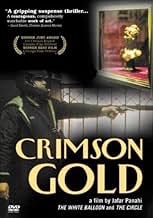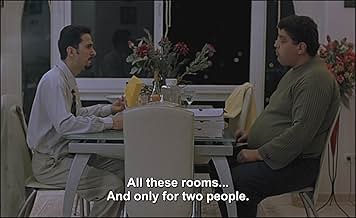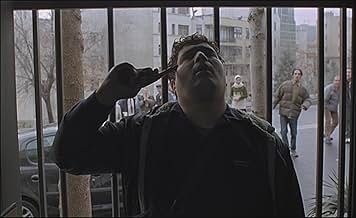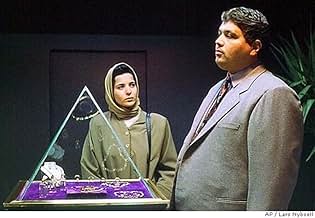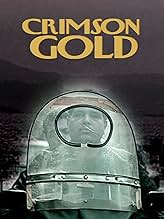VALUTAZIONE IMDb
7,4/10
5571
LA TUA VALUTAZIONE
Aggiungi una trama nella tua linguaAn Iranian pizza delivery man sees the worst of corruption and social unbalance in his city and is driven to crime.An Iranian pizza delivery man sees the worst of corruption and social unbalance in his city and is driven to crime.An Iranian pizza delivery man sees the worst of corruption and social unbalance in his city and is driven to crime.
- Premi
- 4 vittorie e 2 candidature totali
Recensioni in evidenza
Crimson Gold, one of the best films of the year, is absolutely stunning from start to finish. It's gritty and captures the essence of the social struggles in Iran while consistently delivering messages on the struggles we all face in life regarding love and relationships. It's a humanistic film that is extremely subtle, which turned off several viewers (as does Taxi Driver, one of my all-time favorites). Jafar Panahi's slow pacing doesn't allow the film to go into incoherent territory, but again, some viewers may be turned off by this. The pacing is really what allows the messages to set in and provoke the viewers thoughts. It's worth every second of your time, don't miss this gem.
9/10
9/10
8cwx
It's positively amazing what you can sometimes get with non-professional actors, basically playing themselves, especially compared to the many times that real actors flub things entirely. This film follows the sad trajectory of a disaffected pizza delivery driver in Tehran, but while his journey is rooted in reality and presented, aside from the cuts from one scene to another, in something much like real time including all the boring waiting periods (and without the comforting style of similar scenes in Chinatown), the story itself is almost fantastical, probably in part because the people Hussein meets are, to no small degree, more symbolic than anything. The story is heartbreaking and the visuals held my interest without being flashy in the least. Most interestingly, director Jafar Panahi provides us with a removed, rational view of modern Iranian society even as he shows his considerable skill in unobtrusively guiding us along with one man's unfortunate journey.
In September of 1980, as pretty much the first military operation of the Iran-Iraq war by ground forces, Iraqi forces captured the border post at Shalamcheh. Shalamcheh was later to be the site of the largest battle of the war, Operation Karbala-5. A passing reference to Crimson Gold's main character, Hussein, having been at Shalamcheh is made in the film. So what's quite easy to miss here, for a casual Western viewer, is that protagonist Hussein Emadeddin, sometime pizza deliveryman, is a war veteran. An Iranian viewer would be expecting this anyway; it was a huge war that engulfed the generation that Hussein belongs to. Not that many Iranians will see this movie, all Panahi's films are banned in his homeland. Shalamcheh is a resonant name to Iranians, and now contains a war memorial which many travel to. Part of the battle involved "human waves" which is to say lightly armed men, in large quantities charging the well-fortified Iraqi positions, basically suicide attacks. There are stories during the war of young men, apparently volunteers, charging the minefields, in order to clear them for the more experienced soldiers.
The Iran Iraq war was a particularly unpleasant throwback: commentators have compared it to World War One due to the predomination of trench warfare. In both wars for example there was the use of mustard gas, machine gun nests, shelling, and barbed wire. I think it's pretty much implied that Hussein has been a victim of the war. He's been taking cortisone on a long term basis. Due to the copious side effects, you don't do that unless there's something severely amiss, he would have to have a severe long term illness. Prolonged use of cortisone can be prescribed to treat severe lung disorders, I would suggest that Hussein may well have been gassed (hundreds of thousands of Iranian soldiers were gassed by sulphur mustard during the war, plus mustard was used at Shalamcheh during Operation Karbala-5, on civilian populations as well as Iranian troops).
The side effects of long term cortisone use include insomnia irritability, depression, swelling, obesity, diabetes, and depressed immune response. At one point Hussein has to climb four stories to deliver a pizza when a lift is out of order and the tenant won't come down; in the light of his condition, this appears rather more tragic. The character is very easy to sympathise with because, Hussein Emadeddin is played by Hussein Emadeddin, also a pizza deliveryman with severe health problems. There's a lot of realism here.
When thinking of post-war art in film, the term noir floats to the surface. Noir developed as an art form, if not necessarily an aesthetic, as a response to the zeitgeist of the Second World War's aftermath. An anonymous individual from the University Of San Diego has put it better than I can: "The historical setting is the contemporary world that has been corrupted and lost its moral certainty. The prevailing cynicism of characters reflects the reality of the atomic bomb, Cold War, totalitarianism, propaganda, Hollywood blacklist, corrupting power of the government and press. World War II fragmented men, caused them to feel adrift, insecure, alienated, a feeling of having "gone soft" and lacking power to control their lives. The liberal movement was in crisis, due to powerful forces of communism and materialism, causing a loss of faith in progress and man's innate goodness."
Since the war there's been a crisis for the liberal cause in Iranian society, which is referenced at one point by Hussein's friend Ali, who asks what it was like in (pre-theocratical) times when women walked around naked (without veils). It's clear that there's not much fun in the Iran of this world, in one scene Hussein asks a fifteen-year-old policeman if he's ever had fun, the young chap isn't even sure what the word means, and I think that makes two of them.
Despite Hussein having been pretty much left on the scrapheap, rotting in a dingy apartment to the tune of squeaking rats, he's a nice guy, and tries his best to be kind to folk. However, after a series of humiliations, he has had enough and commits a hideous folly. It's a film about injustice that manages to be, at the same time, warm-hearted, staggeringly beautiful and polemical. You can really take Hussein Emadeddin into your heart. Which is rare in a cinematic world where men are often armour plated and hard to love.
My respects for a profoundly humane film. Quite ironically it appears that Jafar Panahi was arrested within the last week whilst giving a dinner party at his home, an absurdity that you might think would make a good scene in a Panahi movie.
The Iran Iraq war was a particularly unpleasant throwback: commentators have compared it to World War One due to the predomination of trench warfare. In both wars for example there was the use of mustard gas, machine gun nests, shelling, and barbed wire. I think it's pretty much implied that Hussein has been a victim of the war. He's been taking cortisone on a long term basis. Due to the copious side effects, you don't do that unless there's something severely amiss, he would have to have a severe long term illness. Prolonged use of cortisone can be prescribed to treat severe lung disorders, I would suggest that Hussein may well have been gassed (hundreds of thousands of Iranian soldiers were gassed by sulphur mustard during the war, plus mustard was used at Shalamcheh during Operation Karbala-5, on civilian populations as well as Iranian troops).
The side effects of long term cortisone use include insomnia irritability, depression, swelling, obesity, diabetes, and depressed immune response. At one point Hussein has to climb four stories to deliver a pizza when a lift is out of order and the tenant won't come down; in the light of his condition, this appears rather more tragic. The character is very easy to sympathise with because, Hussein Emadeddin is played by Hussein Emadeddin, also a pizza deliveryman with severe health problems. There's a lot of realism here.
When thinking of post-war art in film, the term noir floats to the surface. Noir developed as an art form, if not necessarily an aesthetic, as a response to the zeitgeist of the Second World War's aftermath. An anonymous individual from the University Of San Diego has put it better than I can: "The historical setting is the contemporary world that has been corrupted and lost its moral certainty. The prevailing cynicism of characters reflects the reality of the atomic bomb, Cold War, totalitarianism, propaganda, Hollywood blacklist, corrupting power of the government and press. World War II fragmented men, caused them to feel adrift, insecure, alienated, a feeling of having "gone soft" and lacking power to control their lives. The liberal movement was in crisis, due to powerful forces of communism and materialism, causing a loss of faith in progress and man's innate goodness."
Since the war there's been a crisis for the liberal cause in Iranian society, which is referenced at one point by Hussein's friend Ali, who asks what it was like in (pre-theocratical) times when women walked around naked (without veils). It's clear that there's not much fun in the Iran of this world, in one scene Hussein asks a fifteen-year-old policeman if he's ever had fun, the young chap isn't even sure what the word means, and I think that makes two of them.
Despite Hussein having been pretty much left on the scrapheap, rotting in a dingy apartment to the tune of squeaking rats, he's a nice guy, and tries his best to be kind to folk. However, after a series of humiliations, he has had enough and commits a hideous folly. It's a film about injustice that manages to be, at the same time, warm-hearted, staggeringly beautiful and polemical. You can really take Hussein Emadeddin into your heart. Which is rare in a cinematic world where men are often armour plated and hard to love.
My respects for a profoundly humane film. Quite ironically it appears that Jafar Panahi was arrested within the last week whilst giving a dinner party at his home, an absurdity that you might think would make a good scene in a Panahi movie.
Written by the most prominent figure in Iranian social realist cinema, Talaye Sorkh is very much suggestive of some social realities in contemporary Iran. Following an underclass pizza-delivery man for a day or two of his life, Panahi's camera pictures a story that speaks only not for Hussein, but also for many of his real-life fellow citizens in Tehran. Although the film appears to be highly critical of the current social gap between the rich and the poor, Talaye Sorkh is more about alienation and marginalization. Hussein is a war veteran who is devastated by the contradictions of the values he fought for in the Iran-Iraq war and what he witnesses in the affluent neighborhoods of northern Tehran, where he delivers pizzas. He is shocked to see a former lieutenant in one of those chic houses. Thanks to Hussein Emaduddin's great performance, the film by no means begs for sympathy. It seems that the tensions of the society in which Hussein lives, has made him an emotionless man. Hussein's toneless attitude and his unusual calmness speaks of a man whose tolerance comes to a rapid explosion at the end. He is a sort of man who is unable to even feel for his fiancé. Robbing young women's purse doesn't seem to interest him either. Throughout the entire film he is in a state of shock. Although the film's plot is based on a true story, its dialog seem a bit incompetent and weak at times. The dolly shots and the overall camera-work however perfectly contributes in suggesting a schizophrenic atmosphere which has indeed been the intention of Panahi as well. Panahi's latest film is very much similar in theme with his previous award winning Dayareh. That film is also recommended for those who enjoyed this one.
This is a bit of a dream team coming together for a recent iranian film: Kiarostami writes and Panahi directs. And the film is an appropriate hybrid. It has the sloow, thoughtful, gritty realistic, real-life dialogue laden, meandering-but-focused story that Kiarostami makes, along with the focus on social injustice that Panahi had in the Circle.
It's on the top ten for Iranian film which means definitely get it. Great film. Great photography. Lots of teheran and iranian morality police -- cool. If you can't stand movies that don't have a clear Hollywood plot -- if you don't like art house movies -- if you get bored or tired in slow movies -- don't rent it.
It's on the top ten for Iranian film which means definitely get it. Great film. Great photography. Lots of teheran and iranian morality police -- cool. If you can't stand movies that don't have a clear Hollywood plot -- if you don't like art house movies -- if you get bored or tired in slow movies -- don't rent it.
Lo sapevi?
- QuizThe lead actor, who plays a pizza delivery man, is actually a pizza delivery man in real life. He is also a paranoid schizophrenic, which may explain some of the character's traits and behavior.
- ConnessioniFeatured in Cinema Iran (2005)
I più visti
Accedi per valutare e creare un elenco di titoli salvati per ottenere consigli personalizzati
- How long is Crimson Gold?Powered by Alexa
Dettagli
- Data di uscita
- Paese di origine
- Siti ufficiali
- Lingua
- Celebre anche come
- Crimson Gold
- Luoghi delle riprese
- Teheran, Iran(location)
- Azienda produttrice
- Vedi altri crediti dell’azienda su IMDbPro
Botteghino
- Lordo Stati Uniti e Canada
- 148.959 USD
- Fine settimana di apertura Stati Uniti e Canada
- 13.476 USD
- 18 gen 2004
- Lordo in tutto il mondo
- 400.768 USD
Contribuisci a questa pagina
Suggerisci una modifica o aggiungi i contenuti mancanti




